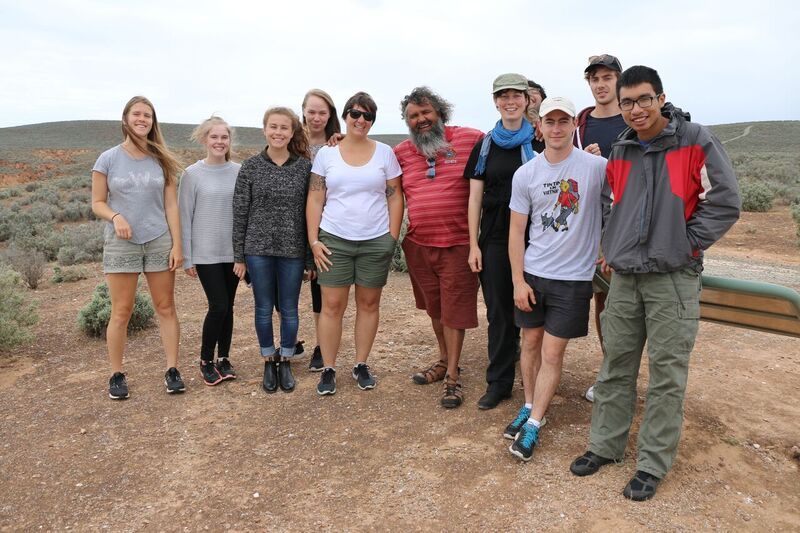Structural Engineer Katie Brown recently participated in an Engineers Without Borders (EWB) Design for Development programme in partnership with the University of Adelaide. The programme included a small number of workshops and a seven day tour across regional South Australia, meeting with Aboriginal leaders to learn about community development, appropriate technology, and humanitarian engineering.
“The study tour provides an opportunity for tertiary students to develop a deeper understanding of the role that engineering and technology can play in creating positive change within communities”, said EWB’s Alanta Colley. “Katie was an industry mentor on the tour; there to share her knowledge and experience with the next generation of engineers”, said Alanta.
The tour was developed with the objective of providing students with professional design and engineering experience, community development and design skills, as well as deepening their understanding of Aboriginal Australia and specific design challenges that communities face. It was this later objective in particular that Katie connected with. “The tour highlighted for me that whilst we are all Australian, not all Australian’s choose to embrace and respect Aboriginal culture”, said Katie. “The level of knowledge that we have about Aboriginal culture is varied depending on our early education. There were no Aboriginal kids at my school so I wasn’t interacting socially or being exposed to their culture in any way; not until I made the conscious choice to learn more”.
The tour kicked off with cultural awareness training led by a Kaurna Elder from the Tauondi Aboriginal College. “The training highlighted how much I didn’t know about Aboriginal culture, and the vast number of Aboriginal language groups across Australia”, said Katie. “It really helped me appreciate the importance of Acknowledging Country and inviting Elders to conduct Welcome to Country ceremonies. I quickly realised that grouping all Aboriginal people together is not appropriate – like saying all European’s are the same. Individual Aboriginal language groups have very different and intricate rules and ways to live”.
A highlight for Katie was the time the group spent with Quenten Agius touring the Clare Valley. “Uncle Quenten shared with us what happened between early settlers and Aboriginal peoples in that area”, said Katie. “I came to understand both sides of the history of Australia’s first people and early settlers. Whilst it’s not pleasant hearing the stories about what happened, it is important that we all learn about, embrace, and share Australia’s true history”.
Other highlights for Katie included learning about the connection Aboriginal people have with Kangaroo Island, and the Coorong – two popular South Australia tourist areas. “During our visit to the Coorong we did a range of activities with the students, including a medicine walk to understand the healing qualities of local flora, and boomerang throwing lessons”, said Katie. “The Coorong is of great importance to the Ngarrindjeri people, who are the traditional owners. However, intervention by non-Aboriginal people has resulted in the environment and land changing with significant negative impact on traditional Aboriginal practices”.
Katie has returned from the tour motivated to raise awareness within Aurecon about Aboriginal culture. “There are some simple yet powerful things we can all do, like shutting down racist remarks”, said Katie. On the final day of the tour Katie presented to the students about the interaction between being an Engineer and being culturally aware. “We can do this through applying social awareness to the people and communities influenced, touched or impacted by what you do”, said Katie. “I wasn’t just a mentor on this trip, I was also a participant and learnt a great deal about Aboriginal Australia”.
Read more about EWB Australia's Leadership & Training Initiatives.
For more information about Aurecon’s Reconciliation efforts contact Abbie Wright, Diversity & Inclusion Manager, Aurecon
The Journal of Humanitarian Engineering is a peer-reviewed publication that details the outcomes of research and field experiences at the intersection of technology and community development.
The EWB Challenge is a design program for first year university students to learn about design, teamwork and communication through participation in inspiring, sustainable, cross-cultural, real-world development projects.
The School Outreach Program educates high school students about humanitarian engineering and global challenges such as water, sanitation construction and climate change.
The Humanitarian Design Summit has been created specifically for university students who would like to travel overseas to learn how to use their professional skills in a humanitarian context through first hand experience.
The Research Program empowers university students to tackle the world’s greatest humanitarian challenges by researching sustainable solutions to problems faced by disadvantaged communities.


